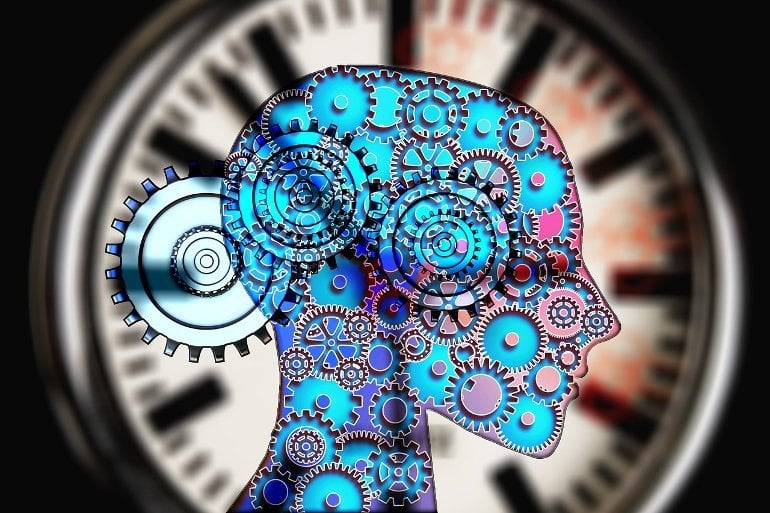Summary: Conceptual knowledge is tied to perceptual and experiential information.
Source: Medical College of Wisconsin
A new study by researchers at the Medical College of Wisconsin (MCW) untangles the mystery of how we know what we know, uncovering that conceptual knowledge is tied to perceptual and experiential information.
“Our study addresses the question of how our thoughts relate to the physical world that we experience through our senses,” said Dr. Leonardo Fernandino, assistant professor of neurology and biomedical engineering at MCW.
“We worked to find out how much of each type of information, including categorical, word-associative, and sensory information, is encoded in neural representations of word concepts.”
Using functional magnetic resonance imaging (fMRI), Dr. Fernandino and his team measured neural activity throughout the brain while participants read hundreds of different words presented on a screen. Each word produced a unique activation pattern in the participant’s brain.
By analyzing these neural activation patterns, the researchers were able to quantify the extent to which different types of information were used by the brain to represent word meaning. Specifically, they evaluated how much information related to natural categories, word associations, or sensory experience was involved in the brain’s representation of word meaning.
The analysis was based on the degree of similarity between word meanings that should be expected according to each type of information.
“As an example, ‘vodka’ and ‘nitroglycerin’ are very similar according to how they appear to the senses, since both are clear, odorless liquids, but we think of them as belonging to very different categories—drinks and explosives, respectively,” said Dr. Fernandino.
Computer modeling was used to predict the degree of similarity between word meanings according to each type of information, and these predictions were compared to the similarities between the neural activation patterns corresponding to each word meaning.

“What we found is that each of these types of information may appear to be encoded in the neural representation of word concepts when examined in isolation; however, when we took into account the way their similarity predictions overlap with each other, our data showed that experiential information was the only type that predicted the similarities between activation patterns independently. The other types of information only predicted the similarities between neural activation patterns to the extent that their predictions matched the predictions of experiential models,” said Dr. Fernandino.
This experimental confirmation that experiences and sensory information are key to conceptual knowledge is groundbreaking for a subject area that has been studied since the fifth century BCE.
“This has been the subject of a long-standing debate in philosophy and psychology that can be traced back to the Ancient Greek philosophers Plato and Aristotle,” said Dr. Fernandino.
Plato argued that humans are born with innate ideas, which are mental templates for all sorts of things we can name or recognize. Aristotle argued that mental categories were not present from birth but were learned from experience.
Today, researchers are still split with respect to these perspectives. Some believe that conceptual categories are represented in the brain in “symbolic” form rather than from learned sensory experiences. As conceptual knowledge is further studied using modern advancements, the research from Dr. Fernandino and the team at MCW is key in providing concrete evidence otherwise.
About this information processing research news
Author: Press Office
Source: Medical College of Wisconsin
Contact: Press Office – Medical College of Wisconsin
Image: The image is in the public domain
Original Research: Closed access.
“Decoding the information structure underlying the neural representation of concepts” by Leonardo Fernandino et al. PNAS
Abstract
Decoding the information structure underlying the neural representation of concepts
The nature of the representational code underlying conceptual knowledge remains a major unsolved problem in cognitive neuroscience. We assessed the extent to which different representational systems contribute to the instantiation of lexical concepts in high-level, heteromodal cortical areas previously associated with semantic cognition.
We found that lexical semantic information can be reliably decoded from a wide range of heteromodal cortical areas in the frontal, parietal, and temporal cortex. In most of these areas, we found a striking advantage for experience-based representational structures (i.e., encoding information about sensory-motor, affective, and other features of phenomenal experience), with little evidence for independent taxonomic or distributional organization.
These results were found independently for object and event concepts. Our findings indicate that concept representations in the heteromodal cortex are based, at least in part, on experiential information.
They also reveal that, in most heteromodal areas, event concepts have more heterogeneous representations (i.e., they are more easily decodable) than object concepts and that other areas beyond the traditional “semantic hubs” contribute to semantic cognition, particularly the posterior cingulate gyrus and the precuneus.






